- Home
- Kevin Ashman
Medieval IV - Ring of Steel Page 3
Medieval IV - Ring of Steel Read online
Page 3
Silently the men ate until finally they sat back and looked at their hosts with gratitude.
‘It is a truly devilish night out there,’ said Fletcher.
‘It is that,’ said Geraint, ‘and I don’t think it is far from the truth to say we may owe you our lives.’
‘That may be a bit of an exaggeration,’ said Fletcher, ‘but it has to be said, you were in a sorry state.’
‘Agreed,’ said Geraint and turned to face his comrade.
‘This is my good friend. He is known as Tarian and is the better man of us both. I trust him with my life.’
‘Tarian, you are welcome,’ said Fletcher. ‘What town do you call home?’
‘A place in the north,’ said Tarian, ‘a town called Dolwyddelan.’
‘So what business brings you to Brycheniog?’
‘It is a long story,’ said Tarian, ‘and the telling will be better from the mouth of Geraint.’
Fletcher turned to face Geraint and all waited for him to start.
‘Well,’ said Geraint, ‘the first part of my story you know well, but I will start from the beginning so we are all made aware of the circumstance that led us to this day.’
‘I joined the army of King Henry when I was a young man but ended up in a dungeon in Acre through no fault of my own. Garyn, my brother, came to my aid and brought me home but not before making an enemy of a corrupt Abbot, the same man who hides behind the cloth of the lord in this very town. When we returned, a Muslim girl came with me and though we could not be wed in the eyes of the church, we grew fond of each other and planned a life together. We did no one any harm and for a while we were accepted into the village. Alas when my health returned I found my mind burned for the brotherhood that service brings and my heart was desperate for the freedom of campaign. I knew that if I was to settle down, then first I had to exorcise the spirits within me that demanded this freedom. I left upon a quest led by Tarian and together we found a land across the seas seen by no other living man.’
‘We courted both hunger and death but when we eventually returned, I was ready to pick up the threads of my past life. Alas it was not to be for I found Misha had been hung as a murderer and my brother Garyn had been outlawed as a brigand. I had nothing left so set myself to defending a young man whose destiny would be to unite Wales against the English crown. For more than ten years I carried out this task until at last he picked up the mantle and it is not ten days since I fought alongside him as he took Edward’s Castle at Caernarfon.’
‘You were there?’ asked Fletcher.
‘I was,’ said Geraint, ‘as was Tarian. It was indeed a glorious victory but the celebrations were cut short when I found out my brother was still alive and had been taken prisoner by an English lord and cast into a dungeon deep.’
‘For all these years I had thought him dead but now, just when it seemed that my path was clear, this news cast clouds before my eyes and I knew that though he may be a brigand, I could not abandon him to rot as he did not abandon me.’
‘So where is he now?’ asked Fletcher.
‘He lies a few leagues from here in the depths of Brecon Castle,’ said Geraint, ‘and I have made it my sworn duty to release him from the hell he must surely suffer.’
‘If he is still alive,’ said Tarian.
‘Granted,’ said Geraint, ‘for he is not only in the hands of Gerald of Essex but I hear the Abbott also dwells within those walls but I will find out if Garyn is there and if he lives, then I swear by all that is holy, I will set him free or die in the trying.’
‘You cannot,’ said Marian.
All three men turned to stare at the woman.
‘Marian,’ said Fletcher, ‘now is not the time.’
‘Yes it is,’ snapped Marian, ‘and I will have my say.’ She turned to Geraint. ‘You cannot free your brother, Geraint Ap Thomas, for if you do it could be the death of our daughter and her son. She has been incarcerated within those walls on the false charge of treason against the king and awaits trial but if you assault those walls with your armies, the prisoners will be the first to die.’
‘I had no idea that your brother was also imprisoned there,’ she continued, ‘and indeed I thought him long dead, but even if I knew the truth of the matter then I would have given him no second thought. Such treatment is suitable for villains and brigands and he is surely such a man. It is an unfortunate coincidence that they share a jailer but if you pursue this course of action then I will not hesitate to seek an audience with Gerald himself and expose your fruitless quest.’
‘Marian,’ said Fletcher again, ‘you will do no such thing.’
‘Yes I will,’ shouted the woman, ‘this man’s brother ran out on our daughter to save his own skin and never set foot within the village from that day to this. He broke her heart, Fletcher, as well you know. Why should we allow these men to try and save a vagabond at the potential cost of our daughter’s life?’
‘Because he is no coward,’ said Fletcher quietly.
‘What did you say?’ asked Marian.
‘I said he is no coward and did not flee to save his own skin.’
‘Of course he did,’ said Marian, ‘he escaped the stocks and fled into the night aided by men of a similar ilk.’
‘He did not,’ shouted Fletcher, getting to his feet, ‘for it was I who released him from his bonds that night. Myself and one other, the young man from the manor who travelled back from the holy land alongside him.’
‘You speak of Dafydd?’ asked Geraint.
‘Aye, that was his name and I would not have shared it with you if he was not already dead, killed by an assassin in the pay of the Abbot.’
‘But I don’t understand,’ said Marian, ‘you told me he ran like a coward, in fact you were his biggest denouncer and painted him a villain of the worst kind.’
‘I had to,’ said Fletcher. ‘I am not proud of what I did but it was for the sake of our daughter. I cut him loose for he was going to be killed by Gerald’s men, slaughtered while he was still in the stocks and unable to defend himself. I could not let that happen so I set him free but by giving him his life I took away his right to freedom for he had escaped the punishment set upon him by the manor. Whether it was just or not, he broke the law.’
‘But why did you denounce him?’ asked Geraint.
‘So there was clear water between him and my daughter,’ said Fletcher. ‘The Abbot knew she loved him and if he had thought for a heartbeat that she still had feelings for him or worse still, knew where he was, then she would have been labelled as an accomplice and faced the gallows. I could not let that happen and knew she had to set upon a new life without him. The only way to do that was to sour him in her eyes but I will say this. What I did, I did with the full knowledge of Garyn. He knew the price to be paid and though his heart was heavy he did what he had to do, live a life of a brigand so Elspeth could live the life of a free woman.’
Marion stared at her husband with a mixture of hurt and misunderstanding.
‘All these years,’ she said, ‘I have thought him a knave and yet you knew differently. Why did you let me continue in my ignorance?’
‘Because it was important Elspeth displayed a natural contempt if questioned,’ said Fletcher. ‘Garyn promised he would never return and after a few years, I also thought him dead. I saw no reason to stir it all again.’
Marian shook her head in disbelief.
‘This is too much to take in,’ she said, ‘how will Elspeth react when she finds out that Garyn is not only a good man but is still alive?’
‘It may not come to that, Marian,’ said her husband, ‘let’s just see what these men propose and take it one step at a time.’
Fletcher looked at Geraint who was also staring at him with a look of disbelief.
‘Well,’ said Fletcher, ‘do you also hate me for my life of untruths?’
‘I do not hate you, Fletcher,’ said Geraint, ‘though it is sad that a good man was separated from his home for all
these years for the sake of a lie. For that, I blame Gerald of Essex, not you.’
‘Then I am relieved,’ said Fletcher. ‘So, now I have opened my heart, perhaps you can finish your tale and explain what it is we can do to help?’
‘Well,’ said Geraint, ‘the thing is we already knew of your daughter’s incarceration. A messenger conveyed the tale to Caernarfon and we heard it first-hand. It would seem that the Abbot claims Garyn is the father of Elspeth’s child and he used the information to get my brother to return.’
‘What do you mean?’ asked Fletcher. ‘Our daughter was imprisoned on a disputed charge of treason. We have not heard the evidence yet but our petitions are met with silence.’
‘I fear the charges are nought but lies to imprison her and her son,’ said Geraint. ‘We were told that the Abbot sent a messenger to Garyn and told him about the boy. He also said that if Garyn did not return to his justice immediately then both woman and child would be hung forthwith.’
Maria’s hand flew to her mouth.
‘And he returned?’ asked Fletcher.
‘He did,’ several weeks since,’ said Geraint. ‘However it seems the Abbot is ill and has not had chance to mete out his punishment.’
‘And if he dies?’
‘Then so does Garyn and your family. That is why we are here, we have to get them both out of there before he either recovers or dies from his illness.’
‘How long have we got?’
‘I know not, it could be weeks or it could be hours.’
‘So what do you intend to do?’
‘I have some thoughts,’ said Geraint, ‘but though I grew up in this area I have been away a long time and will need help from someone who knows the way of the village, who can be trusted and who gives their allegiance to Edward.’
‘Then I am your man, Geraint,’ said Fletcher, ‘I know everyone of note and belong to a group who leans against the control of Longshanks.’
‘In what way?’ asked Tarian.
‘In whatever way we can, said Fletcher. We short measure their purchases in the market, supply the dampest of the hay from the farms, and water the ale, that sort of thing. It is not much but we are all family men and can’t risk discovery.’
‘The smallest of raindrops lead to the greatest of floods, Fletcher,’ said Tarian. ‘Without people like you they would take even more of our lands from beneath our feet but fear not, the time for retribution is upon us. As we speak, the Lords of Wales gather their armies about them and Englishmen tremble behind their walls at the thought of the coming struggle. Caernarfon and Du Bere were but the first of many to fall and when Edward’s soldiers are denied the false safety of their castle walls then they are but mortal men. Men that will fall before Welsh forged steel.’
‘I thought as much,’ said Fletcher, ‘for though Gerald of Essex keeps a tight grip upon our lives, we still hear the tales of traders and troubadours as they travel through the village and our hearts lighten at the news. Despite the threat of retribution from the castle, even here the air is full of rebellion and we knew it was only a matter of time before the people turn against their brutal masters.’
‘Well that time is upon us, Fletcher,’ replied Tarian, ‘and though we must hasten to join our comrades in the north, our quest to free Garyn and your daughter is no less important.’
‘Then lay out your requirements, gentlemen for though my sword arm tires through age, my heart is as strong as it ever was.’
----
Chapter Four
The Road from Bristol to Worcester
October 1294
Edward was seated at a table situated under a temporary shelter set amongst trees at the side of the road. Around him, his personal guard took advantage of the break as did the rest of the column, over two hundred horsemen along with five hundred infantry and a hundred crossbow men, all taken from the invasion army assembled in Bristol waiting to sail to Gascony. They had been on the road only two days and had left Bristol Castle to ride northward, gathering whatever men at arms they could from loyal landowners along the way.
For the past hour, Edward had been reading despatches brought to him from his lords in the south and west of Wales. His face appeared concerned at the news and he consulted regularly with his closest advisors. Finally he stood up and gave instructions to continue the march but as he did, two men rode into the makeshift camp and spoke to one of the guards.
A knight approached the king.
‘What is your report, Henry Lauderville?’ asked Longshanks.
‘Sire, two of the forward scouts have returned and reported a problem. Though the road is clear for ten leagues hence, there is a bridge down across a swollen river. They have engaged carpenters from the local villages to attend the problem as soon as possible but alas there is nothing we can do until the waters are lower. It could be many days before it is passable.’
‘Is there another route?’
‘Twenty leagues east, there lies another bridge, my lord and we are told it remains intact.’
‘This day is beset with problems,’ said the king, ‘but they will not weaken our resolve.’
‘What is your command, Sire’, said the knight, ‘shall we wait and hope the waters lower or take the longer route?’
‘Whichever way we go, our journey is now longer,’ said Edward, ‘and we will not reach shelter before nightfall.’ He turned toward the scout. ‘Head upon the eastern road for another five leagues, he said and there set up my campaign tent for the night. Make sure there is water nearby for the horses and adequate forest to deflect the worst of the rain. The men have tents but I sense a storm coming our way.’
‘Sire, we will find a farm and eject whatever family lives within. You and your court will sleep in a warm bed tonight.’
‘No,’ said Edward, ‘I will stay amongst my men. Do as I command.’
‘As you wish,’ said the scout and turned his horse to ride away.
‘Henry,’ continued Longshanks, ‘summon Fermbaud to attend me.’ Moments later, Nicholas Fermbaud, castellan of Bristol Castle arrived at the king’s side.
‘Sire I was summoned?’
‘Yes,’ said Longshanks, ‘take ten men as a guard and ride to Worcester in my name. Tell them to prepare for our arrival two days hence. I expect lodgings for my court and shelter for the men.
‘Are we not riding into Wales, Sire?’
‘Not yet. I have today received disturbing news about the strength of the revolt and would take stock of the situation. It would be foolhardy to ride headlong into a hotbed of nationalism while their star is on the rise. We will let them enjoy the moment but in the meantime I will revisit the strength of the forces at my disposal. As soon as you arrive in Worcester, send word to the Earl of Warwick and the Earl of Gloucester. Tell them to attend me in haste.’
‘As you wish, Sire’, said Fermbaud and turned to select his men. As he rode away, Henry Lauderville turned to address the king.
‘Sire, if I may be so bold. Would it not be better to strike while the Welsh are distracted through ale and celebration?’
‘Ordinarily I would agree,’ said Longshanks, ‘but the messages put before me this day tell of an uprising that stretches from the north to the southern coast and across the whole width of the country. A single column cannot put down such a widespread revolt so we will need a force of many fronts. The Earls of Gloucester and Warwick already have men to hand and I will seek their aide in this matter. First we will muster at Worcester and take counsel. Once done, we will then decide the best way to extinguish this spark before it becomes a flame.’
----
Near the north coast of Wales, Reginald De-Grey, second Baron of Ruthin sat in the hall of Ruthin Castle within the cantref of Dyffryn Clwyd. His officers shared the same table and together they discussed the latest developments with the Welsh uprising in the North.
‘So what news?’ asked Reginald.
‘Madog has laid waste to Ynys Mon,’ said Gisbourn, one of his
knights, ‘he has burnt Caernarfon town to the ground and taken possession of the Castle. He has left a strong force within its walls and rebuilt the palisade but the main strength of his army has ridden out.’
‘Do we know where?’
‘We have not had chance to secure any spies, such is the speed he has manoeuvred but it seems there was a meeting between Madog and the warlords of Wales a few days ago. There are rumours that each has a role on which they will focus. We do know there is a large force of men heading west and another coming this way.’
‘To Flint?’
‘We are not sure yet. The last we heard was they were certainly riding the eastern road but they could turn north at a moment’s notice. If Rhuddlan be their target they can be here within days.’
‘What is their strength?’
‘Again, it is hard to tell as there are many different columns spread out through the country but I would say those coming this way are at least three thousand strong.’
‘Three thousand?’ gasped Reginald, ‘where would he raise such an army?’
‘The Welsh are flocking to his banner. It would seem this time they have a determination about them as well as organisation.’
‘Still,’ said Reginald, ‘his army is made up of farmers and peasants. The taking of Caernarfon is indeed a setback but the whole thing was fortuitous beyond compare. The castellan of Caernarfon was in Portsmouth tasked with sailing to Gascony with the king as were more than half of his force. I also hear Madog used the cover of the monthly fayre to approach the town and took them unawares. That along with the unfinished walls of the Castle all contributed to a set of circumstances that fell favourably at his feet.’
‘Yet they still defeated the defending force and took the castle walls, Sire and any man capable of doing such a thing should not be underestimated.’

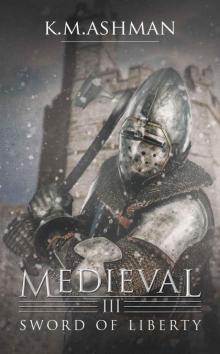 Medieval III - Sword of Liberty
Medieval III - Sword of Liberty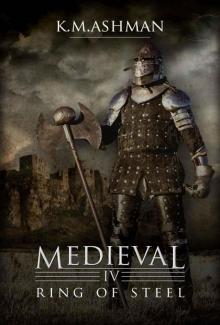 Medieval IV - Ring of Steel
Medieval IV - Ring of Steel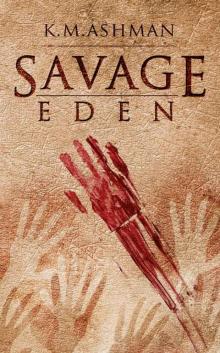 Savage Eden
Savage Eden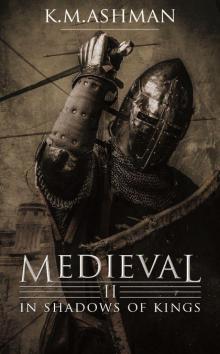 Medieval II - In Shadows of Kings
Medieval II - In Shadows of Kings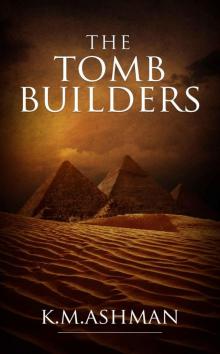 The Tomb Builders
The Tomb Builders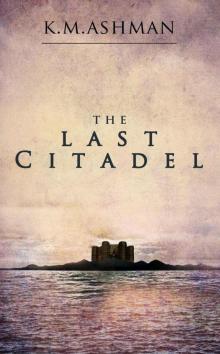 The Last Citadel
The Last Citadel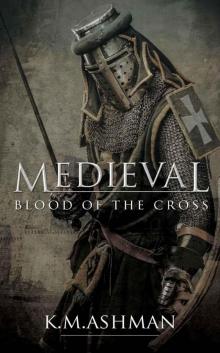 Medieval - Blood of the Cross
Medieval - Blood of the Cross Vampire
Vampire Roman
Roman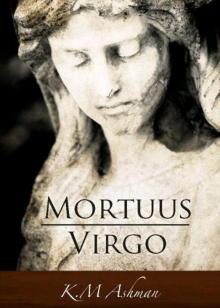 Mortuus Virgo
Mortuus Virgo